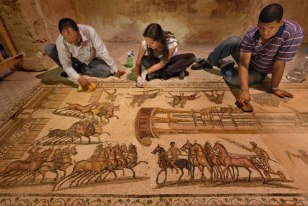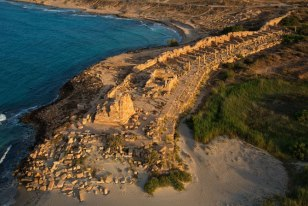Secretary-General of the Libyan National Commission for UNESCO, Fawzia Bariun, said that, although four decades of the old regime had neglected the country’s heritage, the revolution had brought a new challenge.
“During the Arab Spring, international gangs came to these regions to traffic cultural heritage and artefacts, to exploit the transitional phase that follows a revolution,” Bariun said.
Although many Libyans tried to protect both sites and museums during the revolution, some unscrupulous local people have, Bariun said, helped antiquity thieves both find and smuggle artefacts.
The result, the chairman of the Department of Antiquities, Saleh Agab, said is that: “Libyan antiquities are scattered all over the world.”
Some items, however, have been recovered.
There was a modest exhibition of stolen pieces that have been returned to Libya, at the workshop at the King’s Palace, also known as the Museum of Libya. These included the head of Flavia Domitilla, daughter of Emperor Vespasian, which was stolen from Sabratha museum in 1990 and returned to Libya last year.
The workshop highlighted a number of problems in Libya’s current management of its treasures, including the lack of a single clear authority, inadequate inventories of artefacts and insufficient training.
There are also shortcomings in current laws, that do not always match international standards. Moreover, current punishments for antiquities’ smuggling do not reflect the seriousness of the crime.
To prevent further artefacts from being stolen, a training programme will be run for Libya’s heritage professionals, organised by the Department of Antiquities with the help of UNESCO.
The first training session will take place either before or directly after Ramadan and much of it will be conducted in Cyrenaica and the south of the country.
“We have antiquities reflecting five thousand years of history in the region,” Agab said, “this history is not just for Libyans but for the whole human race.”
(Source: Libya Herald)




